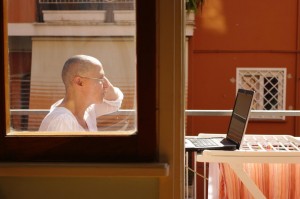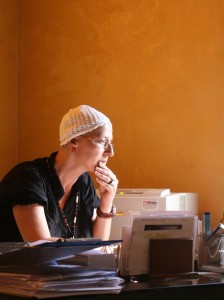Out of darkness: facing breast cancer
Guest blogger: Paola Rolletta, IPS stringer in Mozambique.
I feel neither more “good” nor more “patient”. I am a hard-headed woman, as always. Attached to life, as ever!

Paola Rolletta by Luis Abelard
The day when my friend Pigi, my oncologist, told me that I had breast cancer, I cried desperately. The first thing I did was to phone my partner to tell him this piece of news, of which I had had some premonition. And I understood that premonition really exists.
Curiously, I did not wonder “Why me?” My reaction was: “This cursed disease has hit me too!”
Perhaps some survival instinct made me articulate my feelings in this way, to ease the pain in my heart.
There are more and more of us, women between 40 and 50 years of age, diagnosed with cancer, most of hormonal origin. I must read more about the disease: until now, I have not allowed myself such reading.
First I said that I couldn’t read more about cancer until I finished this calvary of chemotherapy. Now that I finished the eight sessions, I say that I will wait to read until I have the CAT (computer axial tomography) results.
In a nutshell, I don’t want to cram on cancer because I decided to trust my three doctors, the surgeon, the oncologist and the nutritionist, to save me from this darkness.
In darkness
What shocked me most is the darkness you live through while undergoing chemotherapy. It is almost like a mirror lysergic acid experience, but instead of colourful hallucinations, they are black, like anti-matter.
Maybe it is the chemicals shot into my body during six months (eight chemo sessions, 4 FEC and 4 Docetaxel, every 21 days) that makes me see the world, inside and outside, so dark.
The darkness weighs more heavily than the hair loss, the nausea and the vomiting. This metaphysical darkness that totally grabs you is devastating: no words, gestures, musical notes or flowers. For a long time, darkness dominated my thoughts and my soul – an unnatural darkness that does not spring from disease-associated pessimism.
To find strength, I tell myself that mine is a chemical pessimism that – I hope, I trust – will save my life.

Photo: Sol de Carvalho
And I hope that radiotherapy next month will be less dark!
Feeding nitro-glycerine to my body
Earlier this year, I wanted to quit smoking and went to the naturopath for acupuncture. In her office by the sea in Maputo, Dr. Fernanda examined me and told me, without mincing words, to have a mammogram right away. Because I smoked and took birth control pills for decades, I was literally feeding a cancer with all that poison, that nitro-glycerine, she said. Just like this. Raw and cruel.
I was so frightened I took the first flight back to my home country, Italy. That saved my life! Dr. Fernanda was right, in her cruel way. Even when I did not have any symptoms, even though I had not felt any lump, she was right.
Cancer is a multi-factor disease but breast cancer is, most cases, of hormonal origin. Why these hormones go crazy and make us develop cancer it is not known yet, but that they are to blame, this is known. This knowledge is a great leap forward to cure many cancer patients and to prevent the disease.
Ten years ago I read “Illness as a Metaphor” by Susan Sontag while I was working on a documentary on AIDS in Uganda for Portuguese TV.
Ten years later, I re-read it. I tracked it down in the boxes where I stored my books when I moved to Maputo.
In the meantime, Susan Sontag died of cancer. I remember her, wearing a green dress, in a photo taken by her lover Annie Leibovitz.
Every day I repeat to myself Sontag’s call to realism: cancer can be treated with chemotherapy more efficiently than with diets or psychotherapy. Sontag unpacked beliefs that have fed the popular mythology about cancer up to these days.
Every day I repeat her words in the introduction: illness is the night-side of life, a more onerous citizenship.
The disease that has hit me contains, paradoxically, an element of reassurance: every day I must face a new day, a daily routine. Suffering serves as a mediator between my will to live and all that is threateningly unknown. But the unknown is part of life itself. It is life.
En Español
The Latest
 From IPS News
From IPS News- Climate Crisis in Mountains: Borderless Struggle for Frontline Communities
- Niger’s Military Coup Triggers Child Marriages, Sex Work in Neighboring Countries
- Gaza Teetering on the Brink of Mass Starvation
- Harnessing Science-Policy Collaboration: The Vital Role of IPBES Stakeholders in Achieving Global Nature Targets
- AI Policy Can’t Ignore Climate Change: We Need Net Zero AI Emissions
- Conditions Worsen for Belarus Migrants Stuck in ‘Death Zone’ on EU Border
- Another Climate Victory in Europe… and Counting
- By Sending Nuclear Weapons to UK, Could US be Fueling Nuclear Proliferation?
- Small Island States Fostering Effective Energy Transition To Achieve a Blue Economy
- Attacks on UNRWA Not About Its Neutrality, Says UNRWA Chief
- Online fundraising for IPS Inter Press Service at Razoo













